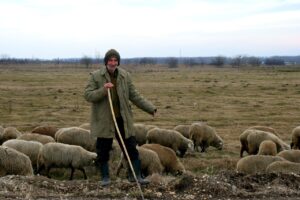Sirach 35: 12-14, 16-18 (RM) or 35: 12-17(RCL); Psalm 34 or 84; 2 Timothy 4: 6-8, 16-18; Luke 18: 9-14.
Did you, by chance, grow up with the older English version of this parable that speaks of “The Pharisee and the Publican?” And wonder what a publican was?
I did. And in my teens I got the answer from a popular CTV program that was broadcast from 1967-1977. “The Pig and Whistle” was a half-hour musical variety show set in a fictional English pub and taped in the studios of CFTO Toronto before a live studio audience. The jovial host, John Hewer, in character as the pub owner, once proclaimed himself “a humble publican.”
And I thought, So that’s it! It’s the Pharisee and the Bar Owner!
Wellll, not quite. Not at all, in fact. The more accurate translation you’re likely to hear today is “tax collector” or “toll collector.” These was compromised – nay, traitorous—persons in their society. They worked for the occupation Roman government to collect ruinous taxes, and would then add on a surcharge to keep for themselves. They could get away with it because they had the might of imperial Rome behind them. They were bitterly resented by their own people.
Just the kind of folks Jesus sought out.
This is a story unique to Luke that presents two fictional characters – caricatures in fact, illustrating two polar extremes. Luke regularly excoriated the Pharisees so this character was a perfect fall guy for hypocrisy and pretense. He basically prays to himself, listing all the reasons why he’s a model of perfect obedience to the law. He’s got this. In the language of toll collectors, he’s got “nothing to declare.”
And then there’s the guy half-hiding in the back. He hasn’t got it, and he knows that. His prayer has a quality of heart-searing honesty that’s utterly foreign to the Pharisee. He shows striking courage in assessing his character and his actions, an appraisal that was undoubtedly accurate. This despised figure in his own society becomes the one whose sincere prayer, born out of shame, pain and regret, is heard.
This is classic Luke. Already in Luke 1:52, in the canticle of Mary, we see “the mighty cast down from their thrones and the lowly lifted up.” The issue is less about grovelling self-abasement than about justice. And about the nature of prayer. And about the nature of God, for that matter. The living presence and power of God in the overturning of systems of oppressive hierarchy and prestige that favour the dominant classes, and in the overturning, to level out the God-given dignity of each person so we meet face to face, eye to eye.
We don’t know whether the tax collector would follow through – the story ends with the simple contrast of characters. But one hopeful takeaway is that it’s never too late to reverse course if you need to. As commentator Dominik Schmitt writes, wherever you are in your life, it’s never too late to give your life a new direction. Today, here and now, we can open ourselves to transformation in the Spirit. Today we can begin to confront injustice. And today we can begin to set our talents and gifts at the disposal of the Spirit to enact justice in the world.
Anyone can do it. The Jesus we know who did not hesitate to invite himself to dinner at the homes of disreputable, marginalized figures such as tax collectors, surely wouldn’t have rejected a bar owner. These were his people. Many years ago, a friend invited me to a gay bar, and I remember looking around and thinking, Yeah, Jesus would be here. And undoubtedly was.
© Susan K. Roll
Susan Roll retired from the Faculty of Theology at Saint Paul University, Ottawa, in 2018, where she served as Director of the Sophia Research Centre. Her research and publications are centred in the fields of liturgy, sacraments, and feminist theology. She holds a Ph.D. from the Catholic University of Leuven (Louvain), Belgium, and has been involved with international academic societies in liturgy and theology, as well as university chaplaincy, Indigenous ministry and church reform projects.





Welcome back Susan. I’ve missed your Friday reflections.
The line that stays with me today is: “wherever you are in your life, it’s never too late to give your life a new direction”.